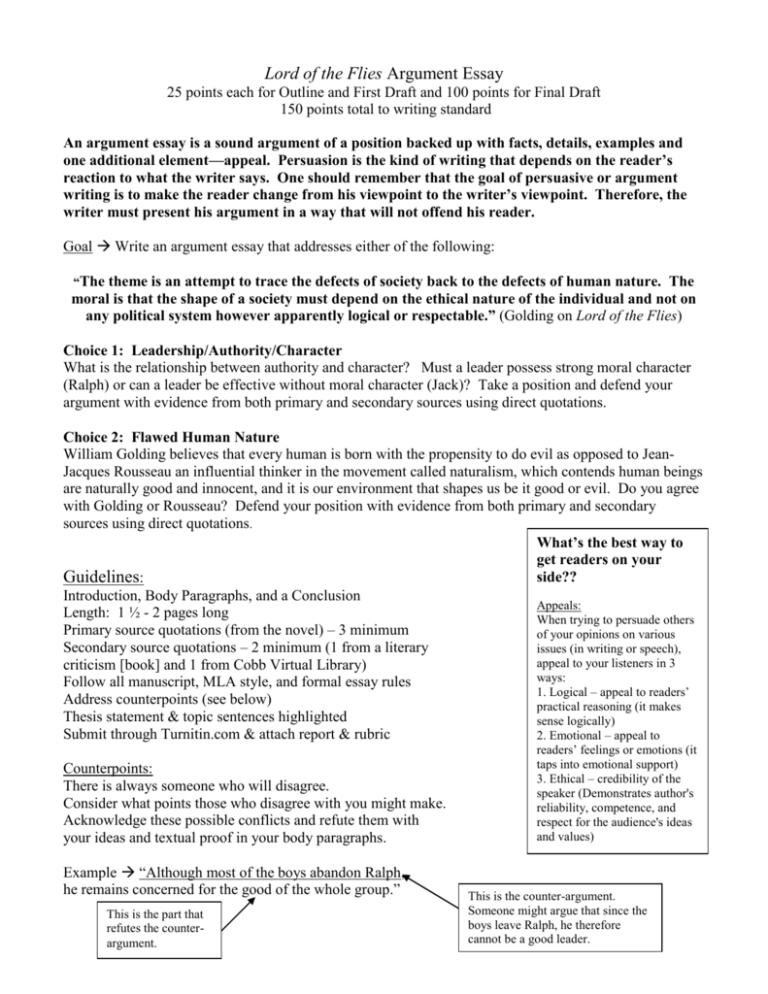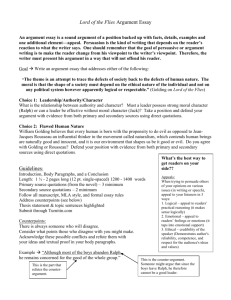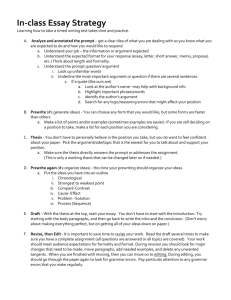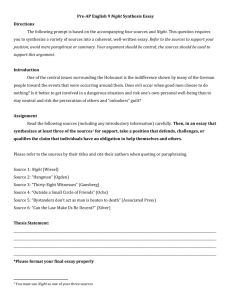Lord of the Flies Persuasive Essay
advertisement

Lord of the Flies Argument Essay 25 points each for Outline and First Draft and 100 points for Final Draft 150 points total to writing standard An argument essay is a sound argument of a position backed up with facts, details, examples and one additional element—appeal. Persuasion is the kind of writing that depends on the reader’s reaction to what the writer says. One should remember that the goal of persuasive or argument writing is to make the reader change from his viewpoint to the writer’s viewpoint. Therefore, the writer must present his argument in a way that will not offend his reader. Goal Write an argument essay that addresses either of the following: “The theme is an attempt to trace the defects of society back to the defects of human nature. The moral is that the shape of a society must depend on the ethical nature of the individual and not on any political system however apparently logical or respectable.” (Golding on Lord of the Flies) Choice 1: Leadership/Authority/Character What is the relationship between authority and character? Must a leader possess strong moral character (Ralph) or can a leader be effective without moral character (Jack)? Take a position and defend your argument with evidence from both primary and secondary sources using direct quotations. Choice 2: Flawed Human Nature William Golding believes that every human is born with the propensity to do evil as opposed to JeanJacques Rousseau an influential thinker in the movement called naturalism, which contends human beings are naturally good and innocent, and it is our environment that shapes us be it good or evil. Do you agree with Golding or Rousseau? Defend your position with evidence from both primary and secondary sources using direct quotations. What’s the best way to get readers on your side?? Guidelines: Introduction, Body Paragraphs, and a Conclusion Appeals: Length: 1 ½ - 2 pages long When trying to persuade others Primary source quotations (from the novel) – 3 minimum of your opinions on various Secondary source quotations – 2 minimum (1 from a literary issues (in writing or speech), appeal to your listeners in 3 criticism [book] and 1 from Cobb Virtual Library) ways: Follow all manuscript, MLA style, and formal essay rules 1. Logical – appeal to readers’ Address counterpoints (see below) practical reasoning (it makes Thesis statement & topic sentences highlighted sense logically) Submit through Turnitin.com & attach report & rubric 2. Emotional – appeal to Counterpoints: There is always someone who will disagree. Consider what points those who disagree with you might make. Acknowledge these possible conflicts and refute them with your ideas and textual proof in your body paragraphs. Example “Although most of the boys abandon Ralph, he remains concerned for the good of the whole group.” This is the part that refutes the counterargument. readers’ feelings or emotions (it taps into emotional support) 3. Ethical – credibility of the speaker (Demonstrates author's reliability, competence, and respect for the audience's ideas and values) This is the counter-argument. Someone might argue that since the boys leave Ralph, he therefore cannot be a good leader. Use the Format Below for this Essay: Introductory Paragraph: Your introduction is an important road map for the rest of your paper. It conveys what your topic is, why it is important, how you plan to proceed with your discussion and finally a thesis that will assert your main argument. Hook sentence(s): attention- getting sentence Set the context: a couple of sentnces that set the stage for your essay and should include title, author, and genre and connects to your hook and leads to your thesis statement Have a Thesis Statement-compose a sentence stating the position you will support with logos (sound reasoning), pathos (balanced emotional appeal), and ethos (author credibility). (NO “I think” statements) Answer: Must a leader possess strong moral character (Ralph) or can a leader be effective without moral character (Jack)? OR Is every human born with the propensity to do evil or does our environment make us so? _________________________________________________________________________ _________________________________________________________________________ ________________________________________________________________________ Body Paragraphs: What are your reasons? (WHY must a leader have moral characters? Or not?) or (What evidence is there that humans are born naturally malevolent? Or not?) These are your main ideas that you want to fully develop. Choose 2 or more and list them below. Then expand and come up with several supporting ideas for each main idea. These supporting ideas will likely draw attention to specific aspects of the novel and research which will be where your quotes come in to prove your point. Reason #1: Support 1: Support 2: Write reasons in complete sentences. These will be your topic sentences. Support 3: Reason #2: Support 1: Support 2: Support 3: Reason #3: Support 1: Support 2: Support 3: Reason #4: Support 1: Support 2: Support 3: Make sure you have a Topic Sentence for each body paragraph – and be sure to use TRANSITIONS between ideas. A TRANSITION wraps up one idea and leads toward the next one. (DO NOT be formulaic with First, Second, Third, In Conclusion-boring!!) Concluding Paragraph: What have you proven in your essay? Sum up your ideas by showing what you have proved in your writing, but DO NOT repeat your thesis. Add a new but related thought. Address counterarguments if you haven’t already. No quotes in the conclusion; these are your thoughts. Answer the “SO WHAT?” What are the implications now that you proved your position? Should only moral people be allowed roles of leadership? Should all parents be forced to take childrearing classes to ensure a proper environment for their innately evil (or good) children? Make a statement of appeal – what’s one last way you can convince readers to agree? Finisher: make you audience remember your essay (not in an infamous way!) Write your “so what” statement here:______________________________________________________ ________________________________________________________________________ ________________________________________________________________________ McFakey 4 Works Cited (example only) Golding, William. Lord of the Flies. London: Putnam, 1954. Halle, Louis. “Tragedy and Heroism in the Lord of the Flies.” Bloom’s Notes. Ed. Harold Bloom Broomall, PA: Chelsea House Publishers, 1996. 24-25. Hamilton, John. “Leaders and Followers.” Magill Book Reviews (1995): N.p. EBSCOhost. Web. 1 March 2010. Slayton, Paul. Teaching Rationale for William Golding's Lord of the Flies. Censored Books: Critical Viewpoints. Ed. Carl Harris. Boston: Houghton, 1993. 351-357. It has a header at the top, as it is considered the last page of your essay Double-space the entire Works Cited page and note that your last name and a page number should appear in the upper right corner, typed in the header Title is centered DO NOT NUMBER THE ENTRIES on your Works Cited page. Alphabetize entries on the Works Cited page using the author's last name (or article name if no author). Each entry starts on a new line All second lines and subsequent lines of entries are indented. o Highlight your text o On the Home menu click on the expand arrow to the left of “paragraph” o In the indentation section special drop-down box, select “Hanging” Follow format from the MLA handout. This gives examples of both text and online sources. Online sources must come from Cobb Virtual. Most of Cobb Virtual articles provide MLA citation with each entry. Simply copy/paste to your WC page. NOTE: ALL online resources other than those accessed through Cobb Virtual MUST be pre-approved. If not, these sources will receive NO credit in your writing. ***You should type only the source(s) that you used in your essay – You should have at least three sources: 1 primary source (novel) and 2 secondary sources (1 from a book & 1 from Cobb Virtual Library). Standards Addressed: ELACC9-10W1a-e: Write arguments to support claims in an analysis of substantive topics or texts, using valid reasoning and relevant and sufficient evidence. ELACC9-10W4: Produce clear and coherent writing in which the development, organization, and style are appropriate to task, purpose, and audience. ELACC9-10W5: Develop and strengthen writing as needed by planning, revising, editing, rewriting, or trying a new approach, focusing on addressing what is most significant for a specific purpose and audience. ELACC910W7: Conduct short as well as more sustained research projects to answer a question. ELACC9-10W8: Gather relevant information from multiple authoritative print and digital sources. ELACC9-10W9: Draw evidence from literary or informational texts to support analysis, reflection, and research. ELACC9-10L1: Demonstrate command of the conventions of standard English grammar and usage when writing. ELACC9-10L2a-d: Demonstrate command of the conventions of standard English capitalization, punctuation, and spelling when writing. ELACC9-10L3: a. Write and edit work so that it conforms to the guidelines in a style manual -MLA Handbook.









